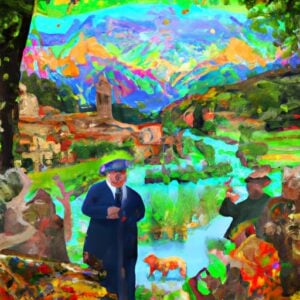Learning the local slang is one of the best parts of traveling. It gives you a glimpse into the culture and personality of a place and allows you to connect with the locals.
Even if you are not fluent in a language, learning a few colloquial words and phrases can open the door to conversation, and native speakers will always appreciate your efforts to overcome the language barrier.
18 Italian colloquial expressions
Here are some phrases that can help you experience la dolce vita during your trip to Italy.
Ahó
Means “Hey,” an informal greeting you’ll probably hear every day. Pronounced like “Ah-ooo“. The “o” is sometimes pulled out for emphasis.
Allora
It’s a filler word, similar to “um” or “so” when you pause for thought.
Ammazza
Just like it sounds in English, it’s an exclamation that can be used to express amazement, disbelief, etc.
You may feel inspired to use this exclamation when you see the breathtaking view of Piazza del Duomo in Milan.
Amore a prima vista
“Love at first sight“. A phrase that describes the passion of Romeo and Juliet in Verona or the feeling you’ll have when you catch your first glimpse of a Tuscan vineyard.
Bella
It’s an informal greeting that can replace “ciao” or “buongiorno“. You may hear it combined with Ahó – “Ahó bella!”
Come il cacio sui maccheroni
“The perfect solution“. This phrase literally means “like sheep’s cheese for macaroni” and is something like the English phrase “Just what the doctor ordered“.
Try it when you take your first bite of pizza, every time you order one.
Fuori come un balcone
This phrase is used to say that someone is crazy, “out of their mind” or even drunk. Literally translated, it means “out like a balcony” – it’s sort of the Italian equivalent of saying someone has “lost their mind“.
‘Na cifra
“A lot” or “a great deal” especially in the context of price. If someone asks you how much a piece of jewelry costs, you might say, “‘Na cifra” (but the purchase was definitely worth it).
Pisolino
It’s the afternoon nap. If you are in Cinque Terre or the Amalfi Coast, lying on the beach after a hearty lunch, you might want to take a quick “pisolino“.
Scendi?
Literally means “Get off (the train or bus)?” You may be asked this question while standing near the exit door of a public transportation vehicle.
Ricco sfondato
Like “baller” in English. It means that you have so much wealth that you are swimming in money.
A fagiolo
This phrase is similar to English “up to the bean“, which means you are being very specific with it. When you hire an accountant who is qualified to do your accounting, you want that person to be “a fagiolo“.
Fare il grande
In English “to pretend to be a big shot“. We all know that one person who pretends to be bigger than they are.
If you are trying to describe this kind of person with friends, now you know what to say.
Avere un chiodo fisso in testa
It means to be fixated on something, literally translated as “to put a nail in one’s head“, for example as the most successful people in the world in business, sports, or other fields, who are often stubborn people.
They are fixated on an idea or concept for which they may be doubted by others.
To some people, this may sound negative, but if you use this idiom as a compliment, they will thank you for it.
Veloce come un razzo
Literally “to be as quick as a rocket“. Whether it’s a quick-witted person or someone who is actually physically fast, you can say “veloce come un razzo“.
Farsi una ragazza o un ragazzo
Means “to score with a girl or a boy“. This is for people who got “lucky” after a night out or a great first date.
Spacchuiso
It is like “cool” in English. The sound of this word itself sounds “cool”. Remember that this word has nothing to do with temperature, but describes how “hip” something is.
Essere tra le nuvole
literally translated as “to be floating in the clouds“. This is not necessarily a bad thing, as daydreamers are known for being creative.
The meaning can go either way, but if you want to be nice to someone, you can use this idiom to describe someone who is very imaginative.
Practice colloquial words and speak better
If you have ever been to Italy, you have probably heard these expressions before, and if you are planning a trip to this beautiful and vibrant country, you are bound to use them.
Practice these phrases when you talk to your neighbors, go out to eat with friends, or store in Italy.
The more you use these colloquial Italian words and expressions in conversation, the better you will become at speaking Italian.










One Response
Thanks for sharing this! It’s always helpful to learn some colloquial expressions when studying a new language.